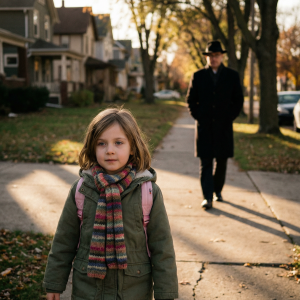My name is Steven. I’m 67 years old, and until recently, I thought I understood what it meant to be a husband, a father, and now, a grandfather. But what happened one Tuesday morning in my living room shattered that illusion—and forced me to make the hardest decision of my life.
It began eight years ago when my son, Samuel, and his wife, Everly, moved into our home. They were struggling financially, and Martha and I—believing family should help family—opened our doors. Samuel was our only child, and we wanted his marriage to have a strong foundation. For nearly a decade, we gave them space, food, support, and money. We believed our kindness mattered. We didn’t realize how little it meant to Everly.
The Breaking Point
The morning it all changed, Martha was in the kitchen arranging flowers. At 73, she still found joy in small things, her gentle spirit as radiant as when I met her 45 years ago. I was reading the newspaper when the sharp cry of our newborn grandson filled the house.
“Steven,” Everly’s voice rang from the living room, clipped and cold. “Could you tell Martha to keep it down? The baby needs quiet.”
Martha had barely been making a sound. Still, she walked toward the living room, flowers in hand, eager to help. Then came a thud. A gasp. And the crash of a vase.
I rushed in to find Martha on the floor, flowers scattered, water soaking into the hardwood. Everly stood over her, clutching the baby with disdain carved into her face.
“Don’t you dare touch him!” she shrieked. “You’re filthy. You won’t lay a hand on my son!”
My wife—who had raised Samuel with boundless love—was on her knees, humiliated in her own home. Tears welled in her eyes, not from pain but from the cruel sting of Everly’s words.
My Son’s Silence
“Samuel!” I barked, my voice heavy with rage.
He appeared in the doorway, looking uneasy but not surprised. That was when I realized: he had seen this before. He had allowed it.
“Dad, Everly’s just protective,” he muttered weakly.
Everly lifted her chin. “Actually, Steven, we’ve decided it’s better if Martha stays in her bedroom when the baby’s in the main areas. For hygiene reasons. I’m sure you understand.”
Hygiene. About my wife. In her own home. Samuel avoided my eyes. His silence cut deeper than Everly’s insult.
That night, as Martha lay silently beside me, I made a decision. Peace at any cost wasn’t peace at all.
Drawing the Line
The next morning, I confronted my son.
“Your wife shoved your mother and called her dirty. Do you honestly believe that’s acceptable?”
“She didn’t shove her,” he said quickly. “Mom just lost her balance. Everly was protecting the baby.”
Protecting. That word. The ease with which he dismissed what we had seen made my stomach churn.
“It’s been eight years, Samuel. Have you even thought about finding your own place?”
He hesitated. “We’ve been comfortable here. And with the baby, it just makes sense to stay.”
Comfortable. Yes—for them. For Martha and me, it had been eight years of small humiliations: furniture rearranged, our master bedroom surrendered, Martha’s cooking dismissed as “too heavy.” Little by little, our home had stopped being ours.
“Who pays for your groceries? Your car insurance? Your phone bill? The utilities that doubled when you moved in?”
“Dad, we’re family,” he said defensively.
“Your mother buys the crib, the formula, the diapers. And what thanks does she get? Being called unclean in her own home.”
He had no answer.
The Mask Slips
Later that week, I overheard Everly on the phone, her voice dripping with triumph.
“Oh, it’s perfect,” she said. “The old woman stays upstairs, and Steven’s easy to handle. Free house, free food, built-in babysitting—it’s like winning the lottery. They’ll never stop us.”
It hit me like ice water. This wasn’t stress. This wasn’t protectiveness. This was calculated.
Days later, while searching for paperwork, I found a stack of utility bills—all in Everly’s name. At the bottom, a mail-forwarding request redirecting everything to her.
Martha’s face went pale when I showed her. “Steven… she’s trying to take our house.”
When I confronted Everly, her smile faltered, but she quickly recovered. “Oh, just a billing mix-up. Temporary. Nothing to worry about.”
Her eyes told a different story.
“This Stops Now”
I called a lawyer. Within days, Everly was served with a notice: all utilities were to be transferred back into our names, the mail forwarding canceled, and she and Samuel had thirty days to vacate. A formal complaint was also filed for identity theft and attempted property fraud.
She stormed into our living room, seething. “You can’t do this! I have rights!”
“You have the right to leave,” I told her.
Samuel stood by, holding the baby, his face pale. When I handed him the documents, reality set in. “Everly,” he whispered, “why would you do this?”
Her composure cracked. “Because someone had to be in control! We’ve lived here eight years! At some point, this house should be ours too!”
“No,” I said quietly. “This house was built on love and respect. Not theft.”
The Fallout
Samuel finally saw what I had seen. When Everly threatened to leave with the baby, Samuel’s voice was steady: “No, Everly. You won’t. I’m filing for divorce. And I’ll fight for custody. A mother who tries to steal from her child’s grandparents isn’t fit to raise him alone.”
The court agreed. Custody went to Samuel, with only supervised visits for Everly. She was convicted of mail fraud and identity theft, sentenced to probation and community service.
Healing What Remains
Six months later, I sat in the backyard, watching Samuel push his son on the swing set. Martha hummed in her garden, peace finally restored. Samuel now pays rent and contributes, but more importantly, he treats us with respect.
One evening, he turned to me. “Dad, I should’ve protected you and Mom sooner. I’m sorry.”
“You protected us when it mattered most,” I told him.
Three years later, Samuel bought a home nearby. Our grandson rides his bike over after school, and the house Everly tried to steal will remain in our family—secured by love, not manipulation.
The three words I said that day still echo in my mind: “This stops now.” Sometimes, that’s all it takes to protect everything that matters.





